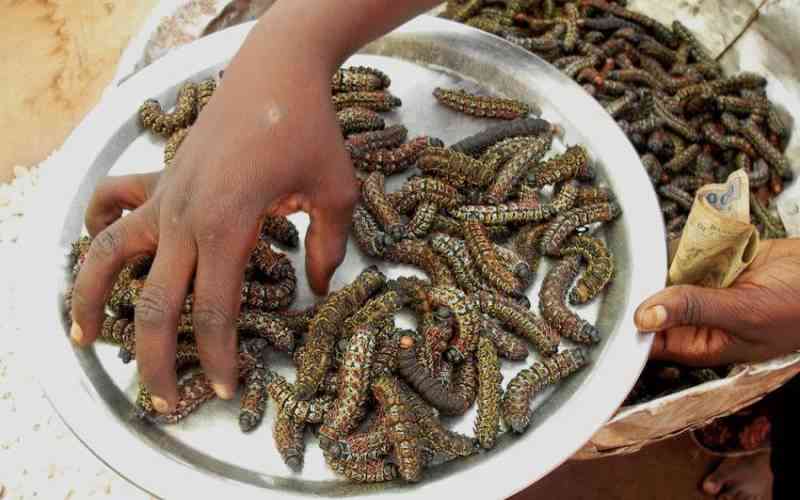Living caterpillars sold in a Central African Market. [Courtesy]
Whenever it rains in Kenya, insects fall a like manna which, coincidentally, means ‘given for free’ in some Bantu dialects. A once common rainy season delicacy in Kenya is the winged termites, which seem to emerge from nowhere, hovering around our light bulbs and falling off our pathways with abandon.
Many other cultures around the world have for millennia consumed locusts, caterpillars, crickets, grasshoppers, beetles and weevils at every stage of life, from egg to larva to pupa to adult. And why not? Numerous studies have shown that insects contain multiple benefits compared to your ordinary steak or source of protein.
Despite their abundance, high protein content, low cost, eco-friendliness and gustatory taste, the UN’s Food and Agriculture Organization estimates that only a quarter of the world’s population eat insects as part of their regular diet.
According to a report published by Medical News Today, one lesser-known rich source of dietary fibre called chitin can be found in the exoskeletons of insects. Chitin is like the protein keratin in human nails and hair. Chitin builds insects’ hard, protective outer shells.
Researchers from the Washington University School of Medicine in St Louis found evidence that consuming chitin can help enhance digestion, lower body fat, and promote weight loss. Fibre from insects improves digestion, helps maintain a healthy weight, and facilitates easy movement of solid waste through the body.
Past studies also show that dietary fibre helps lower cholesterol levels, improve blood sugar levels, and lower the risk of colorectal cancer. It also acts as a prebiotic in the gut microbiome, reducing inflammation, preventing constipation, promoting weight loss, and offering skin protection.
According to Dr Steven Van Dyken, an assistant professor of pathology and immunology at the Washington University School of Medicine and lead author of the study, his team was interested in understanding immune responses to different types of foods and has been studying how the body responds to chitin, which is abundant in insect foods.
They found that upon consuming chitin, stomach distention occurs, triggering an immune response that tells the stomach cells to ramp up the production of enzyme chitinases to break down chitin.
Dr Van Dyken told Medical News Today, “After eating chitin, the digestive process is improved and enhanced by activating cells of the immune system that also affect obesity and metabolism.”
Related Topics
Credit: Source link




